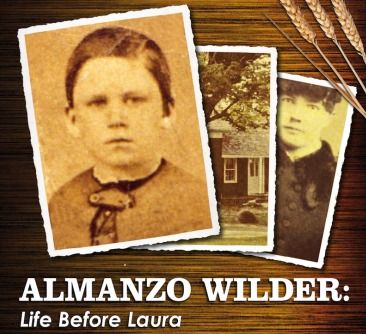
Everyone knows about Laura Ingalls Wilder. Everyone has read the Little House books. Even those who have not read the books have seen the TV show. Those of us with Laura's name were secretly delighted as little girls when we first discovered Laura, especially if we happened to have the brown (or, in my case, auburn) hair and had a slightly older blonde sister - who just happened to be perfect (Hi, Analisa!). But what about that other key figure in Laura's life, apart from Mary? Didn't she have a husband? Oh, yeah...
If we're being honest, most of us will admit that in our minds, Dean Butler *is* Almanzo Wilder (Laura's husband), probably even more than Melissa Gilbert is Laura Ingalls. Whether that is because there is just more Laura-belia out there or what, I don't know, but what I do know is that Legacy Documentaries has gone a long way toward correcting this gap with its DVD Almanzo Wilder: Life Before Laura.

Okay. I'll come clean. When you click on that Legacy Documentaries link, you're going to see a familiar face. I'll wait here, so don't forget to come back. Yes - it's Almanzo. No, it's not! Shame on you (me)! That's Dean Butler! It's hard not to be star struck when realizing that Legacy Documentaries is Dean Butler, but it's such a nice synchronicity that it makes the whole DVD viewing experience more complete. Since Little House, Dean Butler has worked as a producer on several other projects, but I'm really happy that this is the company he chose to form.
Almanzo Wilder: Life Before Laura is a WONDERFUL DVD. I don't say that lightly. There were a million ways this DVD could have been boring or repetitive or have shoddy production value. It was none of these things. It was outstanding. Right after I finished watching it, I could have started it over and watched it again immediately. I know that we will watch it over and over as a family.
Based largely on the events described in Farmer Boy, the second book written by Laura Ingalls Wilder, this DVD uses contemporary pictures of the Wilder farm in upstate New York, along with the original drawings from Farmer Boy and re-enactors (who, most of the time, remain silent) to tell the story of Almanzo's 9th-10th years) to show viewers what life would have been like for Almanzo. The use of the original illustrations, colorized and made mobile (if that makes sense - the illustrations are made to move around the screen as if on a storyboard) recalls the story of Farmer Boy and the Little House books in general, but the narration by Dean Butler and the additional information not in Farmer Boy makes this a complete experience unto itself.
At no point do you feel as if you are watching "Farmer Boy: The Movie." Instead, it is the best of both worlds. The DVD both recalls the book (if you have read it), so that you find yourself smiling in agreement when a food historian talks about Almanzo's apparently unrealistically voracious appetite and offers new insights, as when a Morgan horse expert talks about the historical importance of the breed to the area. In short, my family and I all loved this DVD. If you are old enough to appreciate the Little House books, you are old enough to be captivated by the DVD.
This DVD would make an excellent addition to any library, but definitely belongs in a homeschooler's library. At $21.95 (53 minutes), it is pretty affordable, too. It would also make a terrific gift for a Laura enthusiast. For all that he is not the star of the Little House books, Almanzo is a wonderful character. I'll confess that, as a child, I didn't love Farmer Boy. I read it, but it was not my favorite. I am so glad that I read it to my children last year, and so was able to ensure that they did enjoy it (in other words, I didn't let them skim or skip parts!). As an adult, it is one of my favorite books in the series. Now that I have seen the DVD, I have a whole new appreciation for the book. I can *see* everything! Thanks to an "extra" on the DVD, one is even able to see the town of Malone, NY as it is today!
I love this DVD so much, I'm gushy. To see what other Crew members thought about it (and about one on Laura!), click the banner below.


.jpg)


.jpg)


.jpg)



.jpg)





